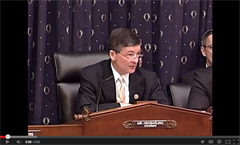Chairman Hensarling's Opening Statement on SEC Oversight
Washington,
April 29, 2014
Tags:
Full Committee
WASHINGTON- House Financial Services Committee Chairman Jeb Hensarling (R-TX) delivered the following opening statement at today’s full committee hearing on oversight of the Securities and Exchange Commission with Chair Mary Jo White: This morning we welcome once again Securities and Exchange Commission Chair Mary Jo White back to the Committee. I wish to note at the outset for the record, contrary to many if not most administration witnesses, she has been most accommodating with her schedule and she is timely with the submission of her testimony. So Madam Chair, you are especially welcome before this committee; we appreciate your cooperation in the Congressional oversight process. This Committee is indeed committed to conducting vigorous oversight of the SEC to make certain it is accountable in fulfilling its mission of maintaining transparent and efficient capital markets, protecting investors, and promoting capital formation. By holding today’s hearing, we hope to better understand the progress the Commission is making in fulfilling its statutory mission and have a better understanding of Chair White’s relative priorities. Now a number on this committee have maintained that the SEC has insufficient resources with which to carry out its mission. I will always have an open mind on the issue but it is not an empty mind. The SEC’s budget has grown substantially in recent years. In fact, the SEC’s budget has increased by 80 percent in the last 10 years and by nearly 300 percent since the year 2000. I again note that when my Democratic colleagues were in the majority even after the passage of the Dodd-Frank Act, they never called for the dramatic budget increases they call for now. Not many other agencies throughout the entirety of the Federal Government have seen such hefty budget increases during this same period of time. I don’t know many constituents in Texas’s Fifth Congressional District -- that I have the honor of representing -- whose family budget has seen an 80 percent increase in the last 10 years. In addition, as we see the national debt clock regrettably continually turn at the pace we have observed, this is something that must loom large over all of our budgetary decisions. I know that some have considered the placement of the clock to be ideological. I personally never knew that math was ideological. Many of us believe that the SEC has given short shrift historically to capital formation. The bipartisan JOBS Act was an attempt to help remedy past SEC inaction on capital formation initiatives. Even President Obama, with whom I rarely agree, called the law a “game changer” for entrepreneurs and capital formation. Regrettably, the SEC remains behind schedule in implementing the JOBS Act. It is important that the implementation of the JOBS Act go forward. Regrettably we still live in an economy where one-in-six are on food stamps. We have the lowest labor force participation rate in a generation. Fifteen percent of our fellow countrymen at the poverty level, and median family income has fallen every year in the Obama Administration. Clearly we have millions of our fellow countrymen unemployed or underemployed who could benefit from the full implementation of the JOBS Act. But during this same period when SEC budgets increased so dramatically, regrettably, there were numerous examples of the agency’s financial mismanagement, squandered resources and mission failure. I hasten to add almost of these examples pre-date Chair White’s tenure, but it does underscore that in Washington, it is not always how much money you spend that counts, it’s how you spend the money. And even though the SEC, I believe, had ample resources and ample authority leading up to the 2008 crisis, clearly someone was asleep at the switch. Whether it was the failure to properly administer the now defunct Consolidated Supervised Entities program, regrettably not doing anything about the credit rating agency oligopoly and the role that played in the crisis, or the failure to uncover the Madoff and Stanford ponzi schemes, notwithstanding the warnings received from multiple market professionals. In addition, regrettably, and notably for any agency that is entrusted with policing financial markets and enforcing accounting standards, the SEC has repeatedly failed audits of its own financial statements and internal controls conducted by the GAO. Which begs the question about how asking for more funding will necessarily prevent future fumbles. How the SEC spends its budget is a legitimate concern, and so is how the SEC spends its time. According to one report, the SEC has finalized less than half of its required rulemakings under Dodd-Frank – nearly four years after the law was enacted. We continue to need to hold Washington accountable. We need to ensure Washington uses resources wisely and efficiently, and we need to ensure that we repeal any unnecessary and ill-conceived Washington regulations that hurt our economy and kill jobs. ### |


